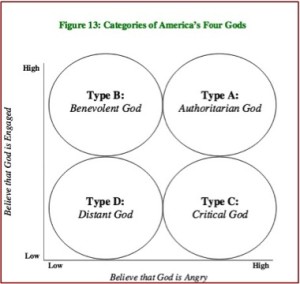American Polytheism
The Baylor Religion Survey looked “under the hood,” so to speak, of the commonly acknowledged fact of American religiosity. Consistent with other findings, it found that 85-90% of Americans said they believed in God, and 71.5% said they prayed at least once per week. Almost half (49.2%) said they attended church at least once per month. “In fact, under the surface American religion is startlingly complex and diverse. Americans may agree that God exists. They do not agree about what God is like, what God wants for the world, or how God feels about politics.” Let’s see what the Baylor researchers found out.
One of the intriguing aspects of the Baylor Religion Survey was how it assessed religious affiliation. Most surveys simply ask the person to select their affiliation or denomination from a list. But this has become increasingly problematic as more and more Americans lose a strong denominational identity through the rise of nondenominational congregations as well as congregations that minimize their denominational ties. I watched with interest as a large local church completed its building program and shed the “Assembly of God” part of its name to simply become “Church.” Rick Warren’s Saddleback megachurch is similar. How many people realize it is part of the Southern Baptist denomination? I didn’t.
What the Baylor researchers did was look beyond mere denominational affiliation. In addition to the typical checklist of denominations, they asked respondents to give the name and address of their places of worship. This enabled them to more accurately sort persons into broader religious traditions. By their calculations, Evangelical Protestants comprised 33.6% of their survey; Mainline Protestants were 22.1%; Catholics were 21.2%; the Unaffiliated were 10.8%; Other was 4.9%; Black Protestant were 5.0%; and Jewish were 4.9%. See the Survey for further information on these religious traditions.
The so-called “nones,” individuals not affiliated with any religious tradition, have been getting a lot of attention in the reporting on religious surveys lately. The Baylor Religion Survey found that 62.9% of American nones believed in God or some higher power. Most of these individuals (44.5% of the 62.9%) reported a belief in a higher power. There were 37.1% of nones who said they didn’t believe in a God or higher power, while 11.6% believed without any doubts and 6.9% sometimes believed in God or believed with doubts. Almost one third of the unaffiliated (31.6%) reported praying at least occasionally; 10.1% of those prayed daily. What comes to mind is the spiritual, not religious language and distinction made within Twelve Step groups.
Another intriguing aspect of the Baylor Religion Survey was how it used 29 questions about God’s character and behavior to get a sense of what people meant when they said they believed in God. They discovered there were two distinct dimensions of belief in God. The first dimension was God’s level of engagement or activity. This captured the extent to which the individual believed God is directly involved in worldly and personal affairs. The second dimension was God’s level of anger. This described the extent to which the person believed God is angered by human sins and tended towards punishing, severe, and wrathful characteristics.
From these two dimensions, the researchers separated their sample into four types of believers: Type A was the Authoritarian God; Type B was the Benevolent God; Type C was the Distant God; Type C was the Critical God. Type A believers scored above the mean on both the activity and anger dimensions. Type B believers scored above the mean on activity, but below the mean on anger. Type C believers scored above the mean on anger, but below the mean on engagement. Type D believers scored below the mean on both the dimensions. See the following figure taken from the Baylor study:
What struck me about this way of assessing belief in God was that it captured more of a sense of how the respondents viewed God, closer to the sense of “God as you understand Him” in Twelve Step recovery. These types don’t neatly fit within a denominational category. You could potentially find all four types within one denomination.
Those who believe in an Authoritarian God represent 32% of the population. They think God is very involved in their lives and world affairs. He is responsible for global events like tsunamis and economic upturns. They also tend to feel God is angry and capable of meting out punishment to those who are unfaithful or ungodly.
Those who believe in a Benevolent God make up 23% of the population. They also see God as very active in their daily lives. But they are less likely to believe God is angry and that He acts in wrathful ways. Instead, they see God as a force of positive influence in the world who is less willing to condemn or punish individuals.
Believers in a Critical God comprise 16% of the population. They feel God does not really interact with the world. However, God still observes the world and views the current stat of affairs unfavorably. His displeasure will be felt in another life and divine justice may not occur in this world
Believers in a Distant God include 24% of the population. They think God is not active in the world; neither is He especially angry. These individuals tend towards thinking about God as a cosmic force, which set the laws of nature in motion, similar to deism. As such, God does not “do” things in the world; nor does He hold clear opinions about human activities or world events.
When these views of God are used to sort through selected aspects of religiosity, there were some interesting results. Believers who saw God as active in personal and world affairs, (Type A and Type B), were significantly more likely to attend church services weekly, pray several times a day, believe that Jesus was the Son of God, and be biblical literalists. See the following table derived from Table 8 in the Baylor Religion Survey.
|
Type A Authoritarian |
Type B Benevolent |
Type C Critical |
Type D Distant |
|
|
Attends church weekly |
50.9% |
31.5% |
9.8% |
7.8% |
|
Never Attends
|
13.5% |
8.2% |
16.7% |
41.5% |
|
Prays several times daily |
54.8% |
31.7% |
6.5% |
7.0% |
|
Never Prays
|
1.8% |
2.5% |
18.4% |
38.7% |
|
Biblical Literalist |
60.8% |
26.5% |
10.2% |
2.5% |
|
Jesus is the Son of God |
41.3% |
27.8% |
14.4% |
16.0% |
Denominational affiliation is not the whole story on American spiritual and religious practices and beliefs. While the Baylor Religion Survey and other research, such as that by the Pew Research Center, suggest that “nones” are becoming increasingly secular, there is clear evidence that many still believe in some kind of a transcendent or higher power and pray at least monthly. The Baylor survey found that around 10% prayed daily. The Types of God used to categorize views of God in the Baylor Religion Survey illuminated an understanding of God that cuts across denominations and has some correspondence with the sense of “God as you understand Him” within the Twelve Steps.
This reflects a growing movement in American religiosity towards what William James described as personal religion in his seminal work, The Varieties of Religious Experience. Institutionally-grounded religious belief and practice is waning, while personal expression of a belief in God and spiritual practices such as prayer continues, even among those who see themselves as not religious. The distinction between institutional and personal religion first articulated by William James in The Varieties of Religious Experience seems to resonate with the modern spiritual, not religious distinction within many Twelve Step groups.





